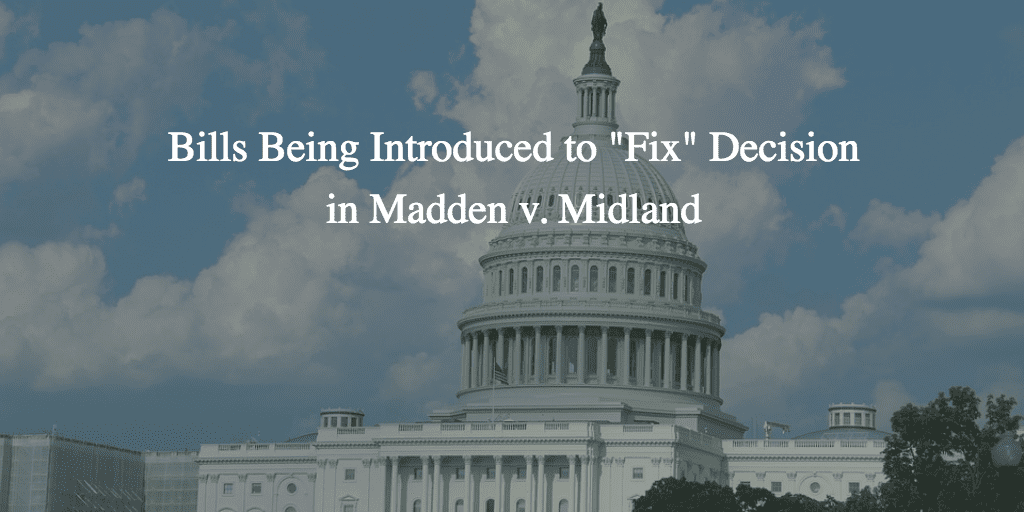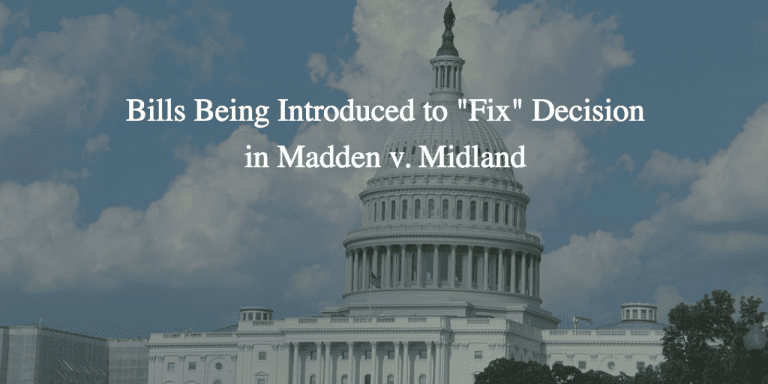
The Madden v. Midland case has been a topic many lenders have been following closely for over two years. Our last update was in June 2016 when the Supreme Court denied a petition to hear the case which left the case unresolved. Now bills are being introduced in hopes to fix the ambiguity around this case.
For a historical perspective you can read our coverage of the case at the below links:
- Supreme Court Denies Petition to Hear Madden v Midland (June, 2016)
- An Update on Madden vs. Midland Funding (May, 2016)
- Madden Tells SCOTUS That Marketplace Lenders Should Not Worry About Madden (February, 2016)
- Madden 2015 Has Nothing to Do With Football (August, 2015)
An article in American Banker this week from Adam Levitin, professor of law at Georgetown University, provides his perspective on what the bills mean for the case. Levitin expresses concern over the bills, believing that the bills being introduced are overly broad and will facilitate predatory lending.
Nat Hoopes, Executive Director of the Marketplace Lending Association disagreed with Levitin’s assessment. Here is what he had to say:
These bills are strongly pro-consumer. They will help ensure that consumers can continue to refinance their higher interest rate debts, saving consumers significant amounts of money through lower interest costs. Furthermore, these bills clearly cannot facilitate predatory lending because they do not change the rate or terms on which any entity in this country (regulated at the state or federal level) can lawfully lend money. The language of the bills simply reaffirms one of the fundamental principles of contract law — that valid loan contracts can be sold on the secondary market.
We also reached out to get another perspective from leading marketplace lending attorney Brian Korn, Partner at the law firm Manatt, Phelps & Phillips:
The Madden fix bills, if passed and signed into law, will resolve the ambiguity and circuit split that currently exists because of the Madden precedent from the Second Circuit U.S. Court of Appeals. The Second Circuit was attempting to interpret legislative history and intent in resolving the tension between federal preemption of the National Bank Act and the states’ interest in maintaining and enforcing their usury laws.
These bills will provide a direct rebuttal to the courts, which is the prerogative of the legislative branch. The intent of Congress is to enforce the validity of a loan after it passes to a nonbank. This will restore order to the marketplace lending world and re-open borrowers from Second Circuit states (NY, CT, VT), where lending was sharply reduced following the Madden decision.
The arguments espoused by Adam J. Levitin are technically accurate and provide a nice context for us to understand the original meaning of “valid when made,” and I agree the new “valid when made,” while different from the original 1800s meaning of the term, is elegantly simple and direct and resolves the ambiguity and uncertainty that have turned many institutional investors into skeptics and kept them on the sidelines from buying Second Circuit loans. The laws will also assist the securitization market and all other forums where loans are sold to nonbanks.
We have a situation created by the Second Circuit decision where responsible lending has been reduced in three states (NY, CT, VT). Demand has not been reduced in these states. People will still find ways to borrow money, whether it be by lease to own programs (that sometimes have triple digit APRs), pawn shops or other nefarious means. But if you are a mid-prime borrower in New York that underwriting models say deserves a 20% interest rate you won’t get a loan today from Lending Club, Prosper or any other responsible online lender. The alternatives are likely going to be more expensive.
The bills before Congress will go a long towards fixing this inequity. While passing new legislation in Washington is proving difficult the word is that these bills could quite likely become law this year.


